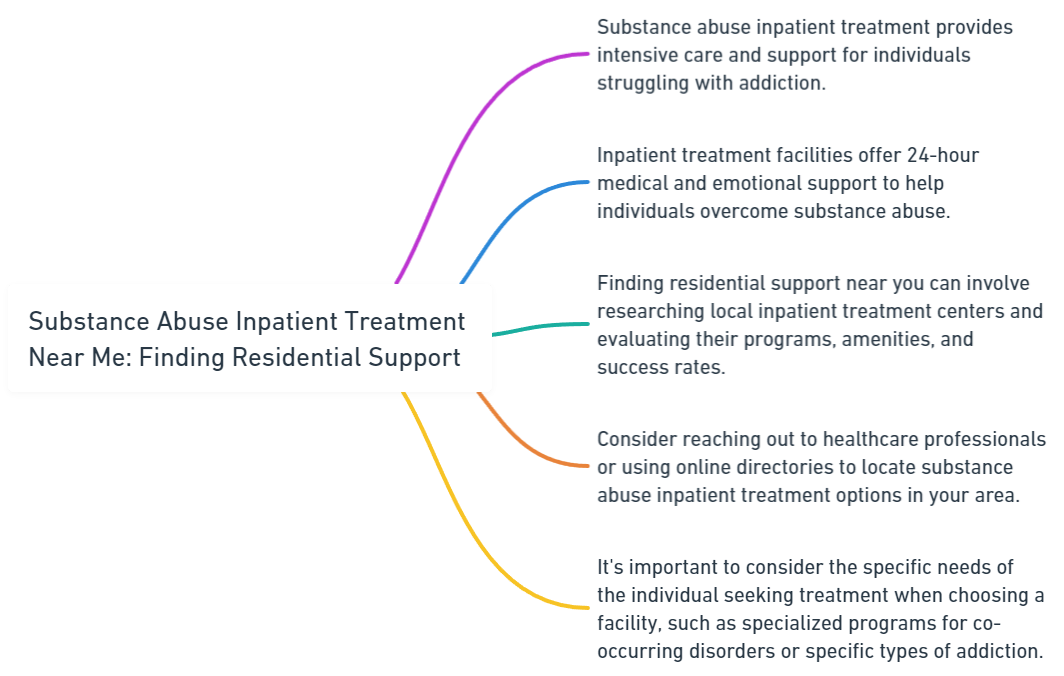Substance abuse is a widespread issue that affects individuals from all walks of life. For those struggling with addiction, inpatient treatment can offer a crucial path to recovery and long-term sobriety. Inpatient treatment programs provide comprehensive care and support, making them an effective option for those seeking residential support.
Inpatient treatment, also known as residential treatment, involves individuals residing at a facility where they receive round-the-clock care and support for their substance abuse issues. These programs are designed to provide a structured and therapeutic environment, offering a range of treatment modalities to address the specific needs of each individual.
There are several key benefits to choosing substance abuse inpatient treatment:
1. 24/7 Supervision and Support: Inpatient treatment provides constant supervision and support, ensuring individuals have access to assistance whenever it is needed. This level of care can be particularly crucial during the early stages of recovery when individuals may experience withdrawal symptoms or intense cravings.
2. Structured and Therapeutic Environment: Inpatient programs offer a structured environment that helps individuals establish healthy routines and habits. These programs incorporate various therapeutic interventions, such as individual and group therapy, counseling, and experiential therapies.
3. Access to Various Treatment Modalities: Inpatient treatment facilities often provide a comprehensive range of treatment modalities to address the complex nature of addiction. These may include cognitive-behavioral therapy (CBT), dialectical behavior therapy (DBT), holistic therapies, and trauma-informed care.
4. Peer Support and Community: Inpatient treatment programs foster a sense of community and provide opportunities for peer support. Connecting with others who are going through similar experiences can be tremendously valuable for individuals in their recovery journey.
When searching for substance abuse inpatient treatment facilities in your area, it is essential to consider several factors:
1. Location: Determine whether you prefer a treatment facility close to home or if you would benefit from a change of environment by seeking treatment in a different location.
2. Treatment Approach: Research the treatment approach employed by different facilities and ensure it aligns with your individual needs and preferences. Some facilities may specialize in specific approaches or offer alternative therapies that resonate with you.
3. Accreditation and Licensing: Verify that the treatment facility is accredited and licensed to provide substance abuse treatment. This ensures that the program meets certain standards of care and adheres to ethical guidelines.
4. Staff Qualifications and Expertise: Look into the qualifications and expertise of the staff members at the facility. It is crucial to receive treatment from professionals who are experienced in addiction treatment and possess the necessary credentials like those at Lantana Recovery in Charleston.
5. Treatment Duration and Plans: Consider the duration of the inpatient treatment program and whether it aligns with your availability and commitments. look into the treatment plans offered and whether they provide a comprehensive and individualized approach.
6. Cost and Insurance Coverage: Understand the financial aspects of treatment, including the cost of the program and any potential insurance coverage. It is important to consider your budget and explore options for financing or insurance reimbursement.
Finding substance abuse inpatient treatment facilities near you can be done through various channels:
1. Online Search: Use online directories and search engines to find treatment facilities in your area. Many directories provide detailed information about each facility, including their specialization, services offered, and contact information.
2. Recommendations from Healthcare Professionals: Consult with your primary care physician, therapist, or other healthcare professionals who specialize in addiction treatment. They can provide valuable recommendations and referrals based on your specific needs.
3. Local Support Groups and Helplines: Reach out to local support groups or helplines dedicated to addiction recovery. These resources often have connections and information about inpatient treatment facilities in the community.
4. Insurance Provider Resources: If you have health insurance, check with your insurance provider for a list of covered inpatient treatment facilities. They can provide information about the facilities in your network and guide you through the coverage and reimbursement process.
5. Checking with Local Mental Health or Addiction Agencies: Reach out to local mental health organizations or addiction agencies in your area. They can provide information on available treatment options and help you navigate the process of finding suitable inpatient treatment.
When contacting other substance abuse inpatient treatment facilities like Lantana Recovery, it is essential to ask relevant questions to gather the necessary information:
- What is the duration of the program, and what is the typical length of stay?
- What treatment modalities and therapies are offered?
- Are there specialized programs for specific substance dependencies or co-occurring mental health disorders?
- What is the staff-to-patient ratio?
- What aftercare or transitional support is provided upon completion of the program?
By understanding the benefits of inpatient treatment, considering key factors in your search, and utilizing available resources, you can find a reputable substance abuse inpatient treatment facility near you that meets your unique needs and supports your journey toward recovery.

Understanding Substance Abuse Inpatient Treatment
“As a country, we have a serious substance misuse problem — use of alcohol, illegal drugs, and/or prescribed medications in ways that produce harms to ourselves and those around us” (Substance Misuse and Substance use Disorders: Why do they Matter in Healthcare?, McLellan, 2017.) Substance abuse inpatient treatment is crucial for overcoming addiction due to the following key aspects:
- Intensive supervision: In substance abuse inpatient treatment, individuals receive round-the-clock care and supervision for detoxification and recovery.
- Medical support: Substance abuse inpatient treatment involves medical professionals who monitor and address physical or psychological withdrawal symptoms. They may administer medication to manage discomfort and facilitate the recovery process.
- Therapy and counseling: Inpatient treatment offers various therapy and counseling options, including individual, group, and family sessions. These provide a safe space to explore the underlying causes of addiction, develop coping strategies, and build a support network.
- Structured routine: Inpatient treatment programs provide a daily routine with therapy sessions, recreational activities, nutritious meals, and rest. This helps individuals establish healthy habits and reduces the risk of relapse.
- Peer support: In inpatient treatment, individuals interact with peers facing similar challenges. Building connections with others in recovery creates a sense of community and encourages commitment to sobriety.
True Story: Mary, a young woman struggling with substance abuse, sought help through inpatient treatment. The structure and support of the program were crucial for her recovery. Through therapy, she discovered the root causes of her addiction and learned healthy coping mechanisms. The round-the-clock care and supervision ensured her safety during detoxification. The strong bonds she formed with other individuals in treatment provided a supportive network even after leaving the program. Today, Mary leads a fulfilling life in recovery, thanks to her commitment to understanding and embracing substance abuse inpatient treatment. Her story demonstrates its effectiveness in helping individuals reclaim their lives from addiction.

Benefits of Substance Abuse Inpatient Treatment
When it comes to substance abuse inpatient treatment, the benefits are undeniable. From round-the-clock supervision and support to access to various treatment modalities, this section uncovers the advantages of undergoing inpatient treatment. Discover how a structured and therapeutic environment, along with the power of peer support and community, can contribute to the journey toward recovery. Get ready to explore the transformative benefits that substance abuse inpatient treatment can provide.
24/7 Supervision and Support
When it comes to substance abuse inpatient treatment, having 24/7 supervision and support is crucial. Here are some key points to understand:
- Constant monitoring: Inpatient treatment programs provide round-the-clock supervision to ensure safety and well-being. Trained professionals are always available to address concerns or emergencies.
- Immediate support: 24/7 supervision means individuals have access to immediate support, especially during crises or intense withdrawal symptoms. Staff is available at all times to provide necessary care and support.
- Accountability and structure: 24/7 supervision establishes a structured and therapeutic environment, helping individuals develop healthy habits, maintain sobriety, and work towards recovery goals.
- Prevention of relapse: 24/7 supervision significantly reduces the risk of relapse by keeping individuals on track with their recovery plans, preventing access to substances, and intervening immediately in case of relapse triggers.
- Emotional support: In addition to physical supervision, 24/7 support includes emotional guidance, encouragement, and counseling to address the psychological challenges of substance abuse. This support system helps individuals build resilience and develop coping strategies.
Having 24/7 supervision and support in substance abuse inpatient treatment is essential for a comprehensive and effective recovery process. It ensures individuals receive the necessary care, guidance, and monitoring to overcome addiction and cultivate a healthier, substance-free life.
Structured and Therapeutic Environment
When seeking substance abuse inpatient treatment, find a facility that offers 24/7 supervision and support, evidence-based treatment options, a structured daily routine, a supportive community, and safe and comfortable living spaces. These aspects promote recovery and growth.
- 24/7 Supervision and Support: Look for a facility that provides round-the-clock supervision and support from trained professionals like the team from Lantana Recovery. This ensures safety and immediate assistance when needed.
- Evidence-Based Treatment Modalities: A quality treatment center should offer cognitive-behavioral therapy, group therapy, and individual counseling. These modalities help address underlying issues contributing to substance abuse.
- Structured Daily Routine: A well-organized schedule of activities and therapy sessions promotes stability and purpose, keeping individuals engaged and focused on their recovery.
- Supportive Community: Foster a sense of community among residents, as peer support can be invaluable in the recovery process. Individuals can relate to and learn from others facing similar challenges.
- Safe and Comfortable Living Spaces: The physical environment contributes to overall healing. Ensure that the facility provides clean, comfortable, and secure living spaces.
By considering these factors, you can find a substance abuse inpatient treatment facility that offers a structured and therapeutic environment conducive to recovery and long-term sobriety.
Access to Various Treatment Modalities
Access to various treatment modalities is essential when seeking substance abuse inpatient treatment. This access guarantees that individuals receive comprehensive and personalized care to effectively address their specific needs.
The different treatment modalities available include:
1. Cognitive Behavioral Therapy (CBT): This therapy helps individuals identify and modify negative thought patterns and behaviors associated with substance abuse. These treatments, according to McHugh et al., in Cognitive-Behavioral Therapy for Substance Use Disorders, address operant learning processes, motivational obstacles, and other cognitive-behavioral interventions. Research shows that these approaches have proven effective in controlled trials and can be combined with each other or pharmacotherapy to enhance their overall outcomes.
2. Dialectical Behavior Therapy (DBT): DBT teaches new skills to manage emotions, improve relationships, and cope with stress.
3. Group Therapy: This therapy allows individuals to share experiences, gain support, and learn from others who are facing similar challenges.
4. Family Therapy: Involving family members in therapy improves communication, fosters understanding, and builds a support system for long-term recovery.
5. Medication-Assisted Treatment (MAT): Some individuals benefit from medications that reduce cravings and alleviate withdrawal symptoms.
6. Holistic Therapies: Activities such as art therapy, yoga, meditation, and acupuncture enhance overall well-being and aid in the recovery process.
7. Dual Diagnosis Treatment: Integrated treatment for addiction and mental health disorders improves outcomes for those with co-occurring conditions.
Access to various treatment modalities ensures that individuals have a comprehensive and tailored recovery journey. It addresses the physical, psychological, emotional, and social aspects of addiction.
Peer Support and Community
Peer support and community are essential elements in substance abuse inpatient treatment. Here are some key points to consider when it comes to the importance of peer support and community:
-
Shared experiences: Peer support allows individuals in treatment to connect with others who have faced similar challenges. Relating to their stories can bring comfort and validation, knowing that they are not alone in their journey toward sobriety.
-
Understanding: In a supportive community, individuals can openly share and understand each other’s struggles. This empathetic environment helps reduce feelings of isolation and shame, creating a safe space for individuals to heal and grow. Mutual understanding provides strength and motivation for continued recovery efforts.
-
Encouragement: Peers can offer invaluable support during difficult times, celebrating milestones and boosting confidence and self-esteem. Their words of encouragement uplift and inspire, serving as a guiding light in the recovery process.
-
Accountability: Being part of a community means being held accountable for one’s actions and choices. Peers can gently remind individuals of the importance of staying committed to their recovery journey and help prevent relapses. This sense of accountability encourages responsible decision-making and facilitates long-term sobriety.
-
Role models: In a supportive community, individuals can find positive role models who have successfully overcome addiction. These individuals serve as an inspiration and source of hope for those still on their recovery path. Witnessing the success of others instills belief in one’s own ability to overcome challenges.

Factors to Consider When Looking for Substance Abuse Inpatient Treatment Facilities Near You
When searching for substance abuse inpatient treatment, several crucial factors come into play. From the location to the treatment approach, accreditation, staff qualifications, treatment duration, and cost, all aspects need careful consideration. Each sub-section will explore these factors, revealing important insights and considerations to ensure you find the right residential support for substance abuse. Let’s embark on this journey to make an informed decision and pave the path to recovery.
Location
Location is an important factor to consider when choosing a substance abuse inpatient treatment facility. It can impact the treatment experience and outcomes. Here are some factors to consider related to location:
- Proximity to Home: Being close to home can have benefits, such as having a support system nearby and easier transitions after completing the program. However, being away from familiar environments and triggers might be advantageous for some individuals to focus on recovery.
- Environment: The location of the facility plays a role in creating a therapeutic atmosphere. Serene and peaceful surroundings, such as countryside or beachside locations, can enhance the healing process. Urban locations, on the other hand, might provide access to additional resources and support networks.
- Accessibility: Consider how easily accessible the facility is for your family and friends to visit and be involved in your treatment. Additionally, proximity to medical facilities can be important in case of emergencies or the need for specialized care.
- Confidentiality: Some individuals prefer treatment centers located far from their local communities to maintain their privacy and prevent potential stigma or judgments from others.
Choosing the right location for substance abuse inpatient treatment requires careful consideration of personal factors and treatment goals. It’s important to weigh the pros and cons of different location options and choose the one that aligns best with your needs.
A study conducted by the National Institute on Drug Abuse found that individuals who participated in treatment programs located away from their home environment had higher completion rates and better long-term outcomes compared to those who stayed closer to home.
Treatment Approach
When considering substance abuse inpatient treatment, it is important to evaluate the treatment approach a facility offers. The treatment approach guides the therapeutic interventions and strategies used in helping individuals recover from substance abuse.
- Cognitive-Behavioral Therapy (CBT): This approach focuses on identifying and changing negative thoughts and behaviors related to substance abuse. It helps individuals develop healthier coping mechanisms and skills to manage cravings and triggers.
- Motivational Interviewing (MI): MI enhances motivation and commitment to change. It explores and resolves ambivalence towards substance use, promotes self-efficacy, and empowers individuals to make positive behavioral changes.
- Dialectical Behavior Therapy (DBT): DBT combines CBT with mindfulness techniques. It is effective in treating substance abuse and co-occurring mental health disorders. DBT focuses on developing skills for emotional regulation, distress tolerance, interpersonal effectiveness, and mindfulness.
- 12-Step Facilitation: This treatment approach is based on the principles of Alcoholics Anonymous (AA). It encourages individuals to engage in a structured recovery program, attend meetings, work through the 12 Steps, and build a support network with peers in recovery.
- Medication-Assisted Treatment (MAT): MAT combines medication, such as methadone or buprenorphine, with behavioral therapies to treat opioid use disorder according to federal guidelines. It reduces cravings, prevents withdrawal symptoms, and promotes recovery.
- Holistic Approach: Some treatment facilities incorporate a holistic approach that considers the physical, emotional, and spiritual aspects of an individual’s well-being. This may involve practices such as yoga, meditation, art therapy, or equine therapy.
Consider the treatment approach that aligns with your personal preferences, needs, and goals for recovery. Research and understand different approaches to make an informed decision and find a treatment facility that provides effective and comprehensive care for your substance abuse recovery journey.
Accreditation and Licensing
Accreditation and licensing play a crucial role in ensuring the quality and effectiveness of substance abuse inpatient treatment facilities. These certifications guarantee that the facility meets specific standards and regulations for safe and successful treatment.
Accreditation demonstrates that the facility has undergone a thorough evaluation to ensure the delivery of top-notch care. It indicates that the facility has fulfilled requirements in terms of staffing, treatment protocols, safety measures, and infrastructure. It is essential to choose facilities accredited by recognized organizations such as the Joint Commission or the Commission on Accreditation of Rehabilitation Facilities (CARF).
On the other hand, licensing is a legal requirement that authorizes the facility to offer addiction treatment services. It verifies the qualifications of the staff members, health and safety standards, and evidence-based treatment programs.
When considering accreditation and licensing, it is important to verify the facility’s current status, and any regulatory actions, or complaints. Checking with licensing authorities or accreditation organizations will ensure that the facility has a good track record of providing high-quality care.
Opting for an accredited and licensed substance abuse inpatient treatment facility guarantees safe and effective treatment in a professional setting.
Accreditation and licensing have significantly enhanced the quality of substance abuse treatment facilities. In the past, there were no established standards or regulations, leading to inconsistencies in care. The lack of oversight allowed some facilities to operate without proper qualifications or offer ineffective programs.
However, the recognition of the importance of accreditation and licensing led to the development of guidelines and monitoring systems. These processes ensure that facilities meet criteria related to safety, staffing, treatment approaches, and overall quality.
Today, accreditation and licensing serve as benchmarks for excellence in substance abuse treatment. They assure individuals and their families that the chosen facility meets stringent standards and provides high-quality care.
Increased emphasis on accreditation and licensing enables individuals to have confidence in their selection of a treatment facility. They can make informed decisions and choose a facility that meets their specific needs while ensuring their safety and well-being.
Staff Qualifications and Expertise
When selecting a substance abuse inpatient treatment facility, it is crucial to consider staff qualifications and expertise. The knowledge and proficiency of the staff can greatly impact the quality of care and treatment effectiveness:
- Qualified and licensed professionals: Choose facilities with highly trained and licensed staff, including psychiatrists, psychologists, therapists, and counselors. These professionals should have relevant experience and expertise in substance abuse treatment.
- Specialized training: Consider if the staff has specific training in substance abuse treatment and related mental health issues. Training in evidence-based therapies like Cognitive Behavioral Therapy (CBT) or Motivational Interviewing can improve treatment outcomes.
- Multidisciplinary team: A comprehensive treatment team should include professionals from various disciplines, such as addiction medicine, nursing, social work, and nutrition. This addresses all aspects of an individual’s well-being during treatment.
- Continuing education: Inquire about the facility’s commitment to ongoing professional development. Staff members who regularly undergo training and stay updated with the latest research and treatment approaches are more capable of providing effective care.
- Supervision and support: Consider if the staff receives regular supervision and support from senior professionals or clinical supervisors. This ensures adherence to best practices and provides an additional layer of accountability.
By considering staff qualifications and expertise, you can have confidence in receiving high-quality care from knowledgeable professionals committed to helping individuals overcome substance abuse and achieve lasting recovery.
Treatment Duration and Plans
When considering treatment for substance abuse inpatient treatment, several factors should be kept in mind:
1. Assessment and Evaluation: The treatment facility conducts an initial assessment to determine the addiction’s severity and any co-occurring mental health issues. This helps create an individualized treatment plan.
2. Detoxification: Depending on the substance and the individual’s situation, a detoxification phase may be necessary to manage withdrawal symptoms safely. The duration of detoxification may vary.
3. Therapy and Counseling: Inpatient treatment involves various therapy modalities such as individual counseling, group therapy, and family therapy. The duration and frequency of therapy sessions may differ based on the treatment plan.
4. Medical Care: Some individuals may require ongoing medical care and medication management as part of their treatment plan. This can affect the duration of inpatient treatment.
5. Continuum of Care: After completing inpatient treatment, a comprehensive aftercare plan is essential for ongoing support and relapse prevention. This may include outpatient therapy, support groups, and sober living arrangements.
6. Individual Progress: Treatment duration can also be influenced by the individual’s progress and response to treatment. The treatment team regularly assesses the individual’s needs and adjusts the treatment plan accordingly.
7. External Factors: External factors, such as insurance coverage, financial resources, and personal commitments, can also impact the length of inpatient treatment.
It’s important to remember that treatment duration and plans should be tailored to the individual’s needs and can vary. The goal is to provide comprehensive and effective care to support long-term recovery.
Cost and Insurance Coverage
When considering substance abuse inpatient treatment, the cost and insurance coverage are crucial factors to keep in mind. It is important to understand the financial implications and determine if you have adequate insurance coverage. To make an informed decision, let’s break down the cost and insurance coverage:
- Cost of Treatment: Research the overall cost of the program, including detoxification, therapy sessions, medication, and aftercare. Make sure to determine if it aligns with your budget and if there are any additional costs not covered by insurance.
- Insurance Coverage: It is essential to contact your insurance provider to fully understand the extent of coverage for substance abuse treatment. Inquire about the specific services covered, such as detox, therapy, medication, and aftercare. It is also important to note any limitations on the number of therapy sessions or days in the program.
- Out-of-Pocket Expenses: Consider any co-pays, deductibles, or out-of-pocket expenses that you may be responsible for. This will help you calculate the additional financial commitment required.
- In-Network or Out-of-Network: Check if the treatment facility is in-network with your insurance provider. Usually, in-network facilities have lower out-of-pocket costs. However, if your preferred facility is out-of-network, find out the coverage options and potential reimbursement.
- Prior Authorization: Make sure to verify if the treatment facility requires prior authorization from your insurance provider. This step ensures that you meet all the necessary criteria for coverage and avoids any unexpected denials.
Assessing the cost and insurance coverage for substance abuse inpatient treatment is crucial. It is highly recommended to be proactive in contacting your insurance provider and the treatment facility to gather accurate information and make an informed decision.
Fact: The 2021 National Survey of Drug Use and Health (NSDUH) by SAMHSA found in 2021, 94% of people aged 12 or older with a substance use disorder did not receive any treatment.

How to Find Substance Abuse Inpatient Treatment Near You
Looking for substance abuse inpatient treatment near you? Discover multiple avenues to find the support you need in your journey toward recovery. From online search tools to recommendations from healthcare professionals, local support groups, helplines, and even insurance provider resources – we’ve got you covered. Get ready to navigate the realm of residential support with ease and find the resources and assistance tailored to your needs, empowering you on your path to a healthier, happier life.
Online Search
When searching for substance abuse inpatient treatment facilities near you, using an online search can provide helpful information. Here are some steps to consider:
1. Use specific keywords: Enter “substance abuse inpatient treatment” and your location to find nearby facilities.
2. Research facility websites: Visit different treatment facility websites to gather information about their programs, services, and approach to treatment. Look for details on therapy modalities, staff qualifications, and treatment duration.
3. Read online reviews and testimonials: Look for reviews or testimonials from past clients or their families to get an idea of treatment experiences and outcomes at different facilities. Keep in mind that individual experiences may vary.
4. Check accreditation and licensing: Look for information on the facility’s website about their accreditation and licensing. This ensures that the facility meets quality standards and adheres to ethical practices.
5. Consider cost and insurance coverage: Check if the facility accepts your insurance and review its financial policies to determine treatment costs. Some facilities may offer financial assistance or payment plans.
6. Contact the facility: Once you have enough information, reach out to the chosen facilities using the provided contact information. Ask any additional questions about their programs, therapies, or admissions process.
Remember, an online search is the first step in finding the right substance abuse inpatient treatment. Follow up with further research, consultations, and possibly visiting the facility in person to make an informed decision.
Recommendations from Healthcare Professionals
When searching for substance abuse inpatient treatment, it is crucial to receive recommendations from healthcare professionals. Their expertise can effectively guide you towards suitable facilities. Here are the reasons why their recommendations hold significance:
1. Expertise: Doctors, psychologists, and addiction specialists possess extensive knowledge about various treatment options. They can provide recommendations for reputable facilities that offer evidence-based care.
2. Personalized Recommendations: Healthcare professionals can evaluate your unique situation, taking into consideration the severity of your addiction and any co-occurring mental health disorders. This allows them to offer tailored recommendations that cater specifically to your needs.
3. Access to Networks: Healthcare professionals have vast networks within the field of addiction treatment. This enables them to connect you with trustworthy treatment centers that have established a good reputation.
4. Ensuring Quality: Recommendations from healthcare professionals guarantee the assurance of receiving high-quality and effective care. They only suggest facilities that meet rigorous standards of care.
5. Continuity of Care: Healthcare professionals have the ability to collaborate with the treatment center and actively participate in your care. This ensures a comprehensive and integrated approach, resulting in optimal outcomes.
By seeking recommendations from healthcare professionals, you can make more informed decisions about substance abuse inpatient treatment, ultimately increasing your chances of successful recovery.
Local Support Groups and Helplines
Local support groups and helplines, such as local support groups and helplines, are valuable resources for individuals seeking support for substance abuse. Here’s why:
- 24/7 availability: These local support groups and helplines are accessible round the clock, providing immediate assistance whenever needed.
- Confidentiality: Local support groups and helplines offer a safe and confidential space for individuals to share their experiences and concerns without fear of judgment or disclosure.
- Peer support: Local support groups and helplines connect individuals going through similar struggles, allowing them to share stories and offer mutual support. In Benefits of peer support groups in the treatment of addiction by Tracy & Wallace, peer support refers to the exchange of nonprofessional, nonclinical help between individuals who share similar conditions or circumstances. This support aims to foster long-term recovery from psychiatric, alcohol, or drug-related challenges.
- Information and guidance: Local support groups and helplines provide essential information about available treatment options, recovery processes, and local resources.
- Emotional support: These local support groups and helplines offer a listening ear, empathy, and encouragement to help individuals stay motivated and focused on their goals.
Insurance Provider Resources
When seeking substance abuse inpatient treatment, it is important to consider your insurance provider’s resources. These resources have a significant impact on both access to treatment and the associated costs. There are several factors that you should take into account, including:
1. Coverage: Take the time to thoroughly review your insurance policy to determine what substance abuse treatment, specifically inpatient services, is covered. It is possible that there may be some limitations outlined in your policy.
2. Network Providers: Check whether the treatment facility you are considering is within your insurance network. Opting for an in-network facility can help reduce your out-of-pocket expenses.
3. Preauthorization: It is essential to find out if your insurance requires preauthorization before you can begin your inpatient treatment. This involves obtaining approval in advance from your insurance provider.
4. Out-of-Pocket Costs: Gain a clear understanding of your financial responsibility when it comes to your treatment. This includes co-pays, deductibles, and any expenses that may not be covered by your insurance. Knowing these details will allow you to better plan for the costs associated with your treatment.
5. Additional Services: Inquire about the coverage provided by your insurance for other important components of your treatment, such as medication management, therapy sessions, and aftercare programs. It is crucial to ensure that your insurance offers comprehensive coverage for a well-rounded treatment plan.
Considering these factors will help you navigate your insurance coverage and make informed decisions about your substance abuse inpatient treatment. If you have any specific questions or need further information, it is best to reach out to your insurance provider directly.

Checking with Local Mental Health or Addiction Agencies
When searching for substance abuse inpatient treatment, it is crucial to check with local mental health or addiction agencies for guidance and support. These agencies have extensive knowledge about the treatment programs and facilities in your area. They can provide information on various types of treatment modalities, including detoxification, residential rehab, and intensive outpatient substance abuse treatment near you.
Furthermore, these agencies are connected to professionals specializing in substance abuse treatment. They can recommend respected and accredited treatment centers that have a proven track record of offering high-quality care.
Consulting with local mental health or addiction agencies can also assist you in navigating the complex process of insurance coverage. They can help you understand your insurance benefits and find treatment centers that accept your insurance plan.
Moreover, these agencies often possess comprehensive information about financial assistance programs, grants, and scholarships that can help alleviate treatment costs. They can aid you in finding options that align with your financial situation.
When contacting local mental health or addiction agencies, it is advisable to come prepared with specific questions about treatment options, timelines, and any concerns you may have. This will enable them to provide you with relevant and accurate information to support your decision-making process.

Questions to Ask When Contacting Substance Abuse Inpatient Treatment Facilities
When reaching out to substance abuse inpatient treatment facilities, it is crucial to ask specific questions in order to make an informed decision. Here are some inquiries to take into account:
1. What is the duration of the treatment program at your facility?
2. Could you please provide information on the program cost and any additional fees?
3. What treatment approaches and therapies are utilized in your facility?
4. Are there medical professionals available on-site?
5. Does the program include detoxification?
6. Is it possible for family and friends to visit during the treatment?
7. What kind of support is offered after completing the inpatient program?
8. Are there any additional services or amenities available?
9. Could you please explain the rules and regulations of your facility?
10. How is the progress and success of the program measured?
By posing these questions, you can acquire significant information about the program, cost, support, and approach provided by the treatment facility. It is imperative to have a clear understanding of what to anticipate before making a decision.
Frequently Asked Questions
How can I find substance abuse inpatient treatment near me?
You can find substance abuse inpatient treatment near you by contacting SAMHSA’s National Helpline at 1-800-662-HELP. They provide free and confidential treatment referrals and information regarding mental and substance use disorders, including residential support options.
Is there a specific helpline for veterans seeking substance abuse inpatient treatment?
Yes, if you are a veteran seeking substance abuse inpatient treatment, you can dial 988 and press 1 to access the Veterans Crisis Line. This helpline connects you with caring and qualified responders from the Department of Veterans Affairs who can assist you in finding the appropriate support.
How can I reach out for immediate help if I’m in distress?
If you are in immediate distress, you can reach out to the Suicide & Crisis Lifeline by calling or texting 988. This 24-hour, toll-free, confidential support line is available to individuals in distress and provides prevention and crisis resources for both individuals and their loved ones.
What information can I get from SAMHSA’s National Helpline?
SAMHSA’s National Helpline provides 24/7 free and confidential treatment referrals and information regarding mental and substance use disorders, prevention, and recovery. You can contact them at 1-800-662-HELP to get information about substance abuse inpatient treatment options near you.
Can I text the Suicide & Crisis Lifeline for support?
Yes, if you prefer to text for support, you can contact the Suicide & Crisis Lifeline at 988. They offer 24-hour, confidential support for individuals in distress. You can reach out via call or text to receive the necessary assistance.
How often is the provided information updated?
The provided information was last updated on 04/24/2023. However, it’s always recommended to verify and confirm the availability of substance abuse inpatient treatment options by contacting the respective helplines mentioned above.









